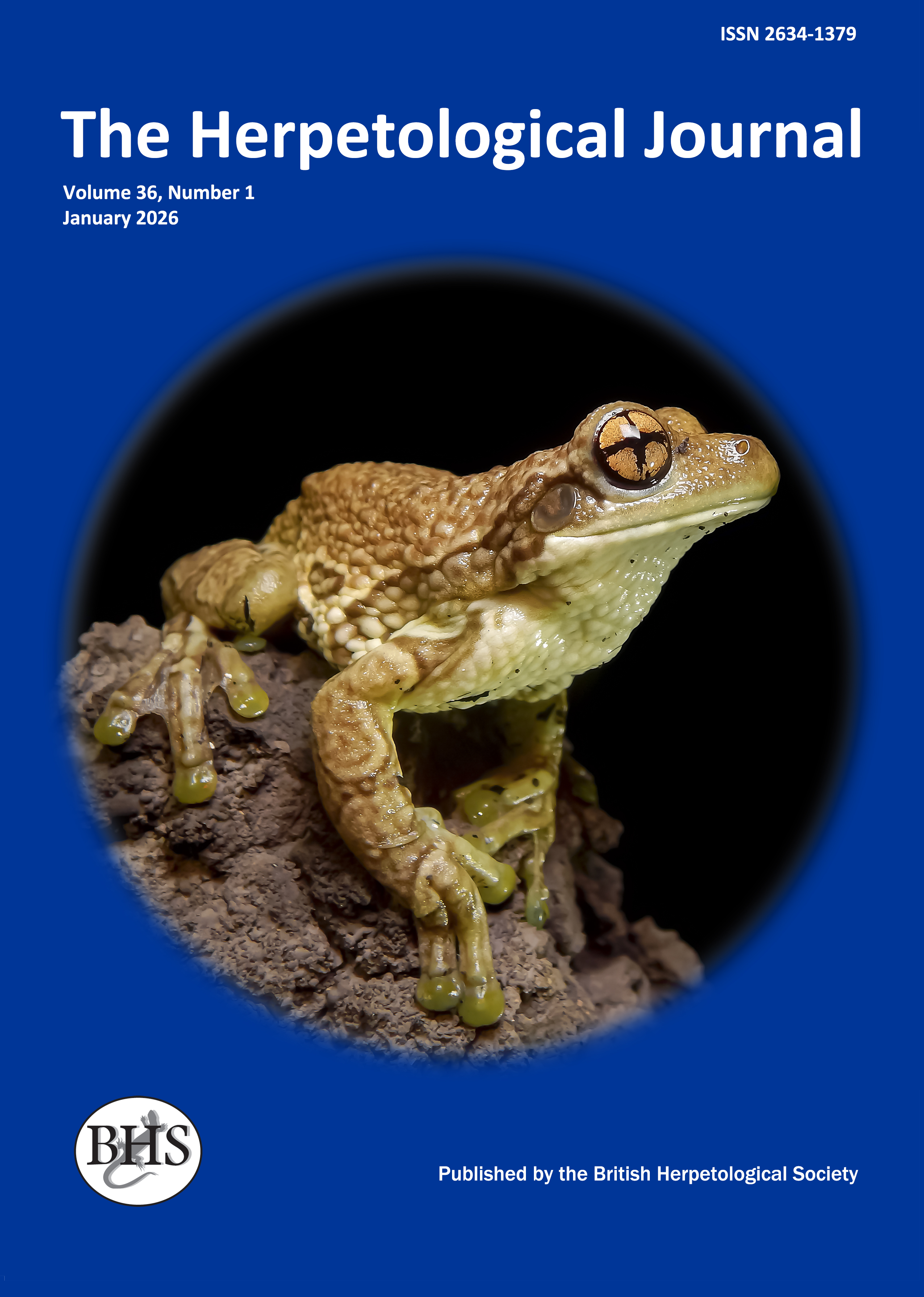
The Herpetological Journal
The Herpetological Journal is the Society's prestigious quarterly scientific journal. Articles are listed in Biological Abstracts, Current Awareness in Biological Sciences,Current Contents, Science Citation Index, and Zoological Record.
ISSN 0268-0130
2023 Impact Factor for the Herpetological Journal is 1.1, with the Journal sitting just below Quartile 2 in Zoology, at percentile 46.9
pdf 05. New evidence for distinctiveness of the island-endemic Príncipe giant tree frog (Arthroleptidae: Leptopelis palmatus)
1788 downloads
Open Access
https://doi.org/10.33256/31.3.162169
pp. 162-169
Authors: Kyle E. Jaynes, Edward A. Myers, Robert C. Drewes & Rayna C. Bell
Abstract: The Príncipe giant tree frog Leptopelis palmatus is endemic to the small oceanic island of Príncipe in the Gulf of Guinea. For several decades, this charismatic but poorly known species was confused with another large tree frog species from continental Africa, L. rufus. Phylogenetic relationships within the African genus Leptopelis are poorly understood and consequently the evolutionary history of L. palmatus and its affinity to L. rufus remain unclear. In this study, we combined mitochondrial DNA (mtDNA), morphological, and acoustic data for L. palmatus and L. rufus to assess different axes of divergence between the species. Our mtDNA gene tree for the genus Leptopelis indicated that L. palmatus is not closely related to L. rufus or other large species of Leptopelis. Additionally, we found low mtDNA diversity in L. palmatus across its range on Príncipe. We found significant morphological differences between females of L. rufus and L. palmatus, but not between males. We characterised the advertisement call of L. palmatus for the first time, which is markedly distinct from L. rufus. Finally, we summarised our observations of L. palmatus habitats and additional notes on phenotypic variation and behaviour. Our study reinforces the distinctiveness of L. palmatus and provides information important for the conservation of this endangered species.
A rã gigante de Príncipe, Leptopelis palmatus, é endêmica da pequena ilha oceânica de Príncipe no Golfo da Guiné. Por várias décadas, esta espécie carismática mas pouco conhecida foi confundida com outra espécie grande de rã da África continental, L. rufus. As relações filogenéticas dentro do gênero africano Leptopelis são mal compreendidas e, conseqüentemente, a história evolutiva de L. palmatus e sua afinidade com L. rufus permanecem obscuras. Neste estudo, combinamos dados de
DNA mitocondrial (mtDNA), morfológicos e acústicos de L. palmatus e L. rufus para avaliar diferentes eixos de divergência entre as espécies. Nossa árvore de genes de mtDNA para o gênero Leptopelis indicou que L. palmatus não está proximamente relacionada a L. rufus ou outras espécies grandes de Leptopelis, e encontramos baixa diversidade de mtDNA em L. palmatus em toda a sua distribuição em Príncipe. Encontramos diferenças morfológicas significativas entre as fêmeas de L. rufus e L. palmatus, mas não entre os machos. Caracterizamos o canto reprodutor de L. palmatus pela primeira vez, que é marcadamente distinto do de L. rufus. Finalmente, resumimos nossas observações dos habitats de L. palmatus e notas adicionais sobre variação fenotípica e comportamento. Nosso estudo fornece informações importantes para a conservação dessa espécie ameaçada de extinção
Keywords: bioacoustic, morphology, endemic, mitochondrial DNA, island, São Tomé and Príncipe

